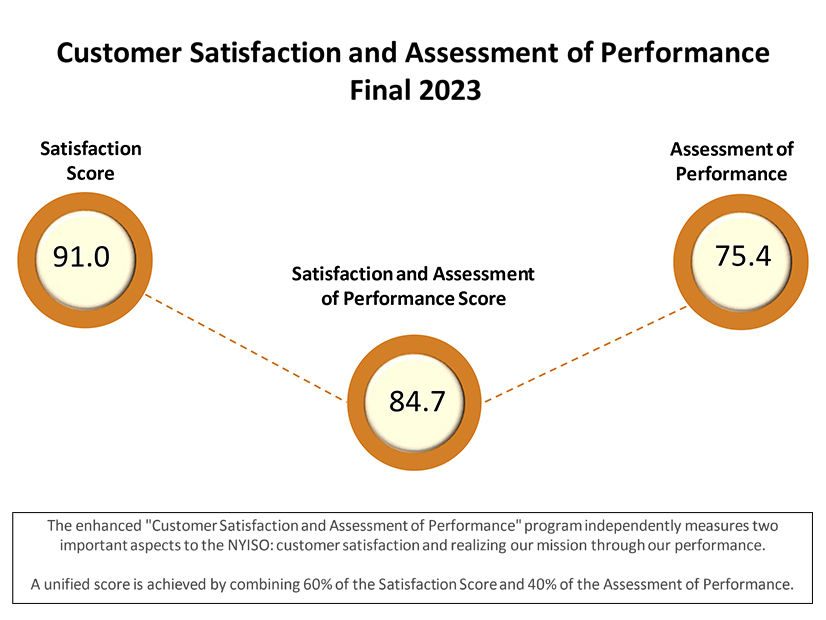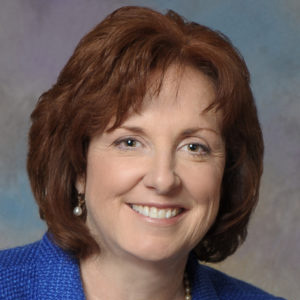Survey: Customer Satisfaction down, but Still ‘Very Good’
The NYISO Management Committee was informed March 27 that the ISO received a total satisfaction and performance score of 84.7, according to the eighth annual assessment by the Siena College Research Institute.
Siena, a New York-based pollster, independently evaluated two aspects of NYISO’s operations: customer satisfaction, which gauges the quality of consumer interactions and engagement; and assessment of performance, which determines if the ISO is “realizing [its] mission through [its] performance.”
NYISO scored 91 in satisfaction and 75.4 in performance; the final score, 1.7 points lower than last year’s, is weighted 60% on satisfaction and 40% on performance.
Siena Director Don Levy explained that the survey involves asking both market participants and senior executives throughout the year to “assess the degree to which NYISO is enacting its mission, including things like reliably operating the grid, administering open and competitive markets, and providing factual information.”
NYISO achieved its highest scores the previous year, with 92.3 in satisfaction and 77.6 in performance. “That score was a historic high and was bound to decline, so now the ISO has just regressed back to where it was in previous years,” Levy said. (See NYISO Receives ‘Exceptional’ Customer Survey Scores.)
The ISO “deserves a pat on the back” for consistently scoring high in customer satisfaction, Levy said, but he noted that it should strive to enhance its performance assessment by market participants, which declined about 5 points from last year and is “lower than it has been over the past four previous years.”
Specifically, NYISO should focus on improving its perceived underperformance in reliably operating New York’s grid, Levy said. That metric dropped 6.8 points from last year. However, he also acknowledged that NYISO’s professionalism consistently scores above 90 points, with respondents frequently writing how the ISO is “excellent, excellent, excellent at handling all interactions.”
Levy urged NYISO to redouble its efforts to improve communication channels and engage more directly with market participants, emphasizing that the results are not “a call to jump off a cliff” but a reminder that the ISO has merely “dropped from exceptional to just very good” and has room for improvement.
Co-located Storage Resource Participation
The MC approved proposed tariff changes allowing energy storage resources (ESRs) co-located with a dispatchable generator behind a single point of interjection to participate in the ISO’s energy markets.
The revisions, approved by the Business Issues Committee on March 13, broaden the list of resources that can be included in the ISO’s co-located storage resource (CSR) models and are part of the wider hybrid storage resource (HSR) effort to couple generators with ESRs and further integrate them into New York’s energy markets. (See “Co-located Storage Resources,” NYISO Business Issues Committee Briefs: March 13, 2024.)
NYISO aims to file the proposed HSR model and the approved CSR updates in the second quarter and implement the CSR updates by year-end. However, the changes will necessitate additional modifications to comply with FERC Order 2023 that will not be developed until the ISO submits its final compliance filing.
Capacity Accreditation
The MC also approved proposed tariff revisions intended to enhance the ISO’s capacity accreditation modeling by more accurately reflecting factors such as natural gas constraints and correlated derates essential for calculating capacity accreditation factors (CAFs) and capacity accreditation resource classes (CARCs).
Approved by the BIC last year, the revisions would ensure capacity resources receive compensation that aligns with their performance, availability and marginal contribution to reliability needs. They came after resource adequacy analyses indicated capacity accreditation models were producing inaccurate CAFs and CARCs for some resources and failing to account for metrics not represented in installed reserve margins and locational capacity requirements.
The CAFs and CARCs for the 2024/25 capability year were respectively published Feb. 26 and Nov. 30. (See “Capacity Accreditation,” Hydrogen Getting Resource-specific Rules in NYISO Markets.)
The revisions would also update the installed capacity (ICAP) supplier bidding requirements. Suppliers, unless exempted, must now either schedule a bilateral transaction or bid energy in the day-ahead market (DAM) with a normal upper operating limit (UOLe) at or above their ICAP equivalent of unforced capacity or notify the ISO of any outages. This would address a loophole in which existing market rules did not explicitly prevent ICAP suppliers from meeting their availability obligations by offering only a portion of their capacity in the DAM at an UOLe.
Order 2023 Update
NYISO CEO Rich Dewey informed the MC that amendments FERC made to Order 2023 necessitate delaying the ISO’s final compliance filing beyond the originally scheduled April 3 deadline.
Dewey said the exact submission date remains uncertain as staff “are still reviewing the details,” but a presentation scheduled for the Transmission Planning Advisory Subcommittee’s (TPAS) meeting April 1 suggests the ISO plans to submit its filing by May 1.
FERC on March 21 modified and clarified its new generator interconnection rule and extended the compliance deadline, after rejecting multiple challenges that sought rehearing. (See FERC Upholds, Clarifies Generator Interconnection Rule.)
Dewey assured the MC that more information about NYISO’s Order 2023 filing will be shared at the TPAS meeting, with stakeholders commenting on further revisions at the Interconnection Issues Task Force’s meeting April 15.
Board Compensation
Dewey also reported to the MC that the ISO’s Board of Directors approved a $3,500 increase in the annual retainer for directors, to $80,000.
The board adjusted its retainer about a year ago, raising it by $5,000 to $76,500, and will reassess the need for additional compensation changes annually instead of every three years, as had been the practice. (See “Board Compensation,” NYISO Receives ‘Exceptional’ Customer Survey Scores.)
Dewey mentioned that the board continues to interview potential members but has not yet met to formalize any decisions, though it hopes to do so in April.
NYPSC Confirmations
The New York State Senate confirmed Uchenna Bright and Denise Sheehan as the new commissioners at the state’s Public Service Commission on March 27.
Gov. Kathy Hochul (D), who nominated both in late February, praised the confirmation, saying in a statement that the new “commissioners will bring unique and invaluable expertise to the PSC at a pivotal time for New York’s energy future.” These are Hochul’s first nominations to the seven-member PSC, with each commissioner serving a six-year term.
Bright, a longtime environmental advocate, was Northeast lead for E2, a nonprofit group of business leaders that lobbies for green policies and partners with the Natural Resources Defense Council. Sheehan, a former New York Department of Environmental Conservation commissioner, was an executive vice president at Capitol Hill Management Services, an Albany-based association management company. She has also served as a senior adviser to the New York Battery and Energy Storage Technology Consortium. Their confirmation hearing was March 26.
Gavin Donohue, president of the Independent Power Producers of New York, said in a statement that Sheehan “brings a balanced point of view between safe, reliable and affordable service, and her decorated career within government and the industry speaks for itself.” Bright “will provide expertise on environmental policies with economic costs and benefits at the front of mind in a way that balances a good economy and environment,” he said.
The New York League of Conservation Voters praised Hochul’s nominations, saying their expertise and environmental advocacy make them “welcomed additions to the PSC.”



